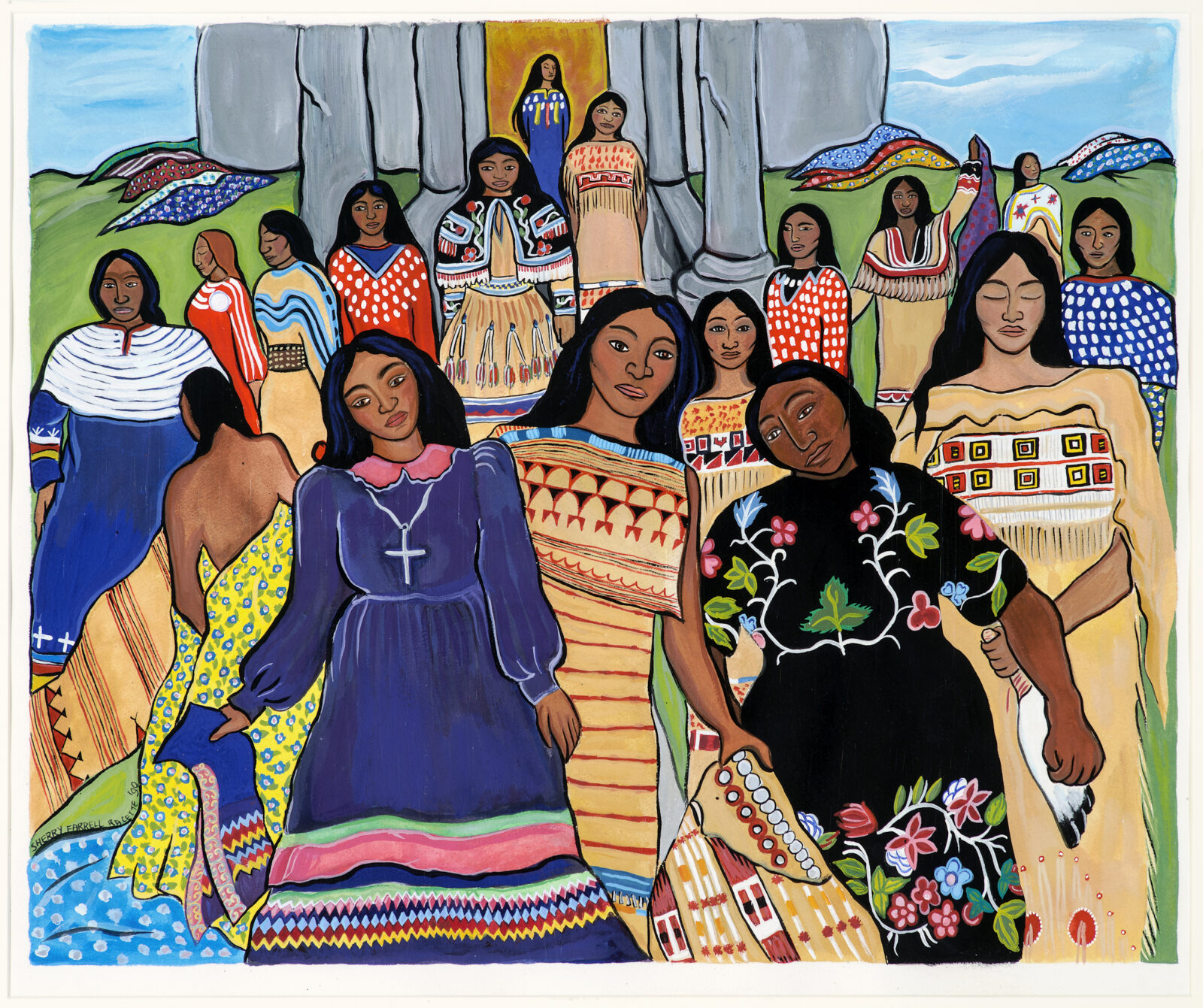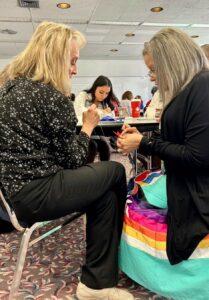By Laura Westfall
The content in this blog post may be difficult and/or triggering. If you or someone you know needs emotional assistance related to this topic or the information in this article, help is available 24/7 through the MMIWG Support Line, 1-866-413-6649.
An Event in Honour of Red Dress Day

On May 4th, the Indigenous Engagement and Communication team and the Centre for Human Rights Research held ‘An Event in Honour of Red Dress Day.’ It took place one day before Red Dress Day – the National Day of Awareness for Missing and Murdered Indigenous Women and Girls and Two-Spirited People (“MMIWG2S+”). The event consisted of a seminar by Sandra DeLaronde and a beading workshop led by Gerri-Lee Pangman.
Sandra DeLaronde began by emphasizing the long history of Indigenous women’s activism in response to MMIWG2S+, as well as initiatives and government-based inquiries set to address the issue. From the Aboriginal Justice Inquiry in 1988, to the Missing Women Commission of Inquiry (“Pickton inquiry”) in 2010, and more recently, the National Inquiry into MMIWG in 2015, the issue of MMIWG2S+ is not a new phenomenon. Rather than meaningfully act to address the issue, governments continue ordering studies and inquiries for information they already have. The state’s inaction towards the issue frustrates many advocates who say there needs to be more accountability from the federal government. This history shows that MMIWG2S+ has become so “normalized” that, too often, the police and the public are apathetic when a family is concerned about their missing relatives. Thus, advocates such as DeLaronde urge that we de-normalize when Indigenous women and children go missing.
DeLaronde identified a step towards this de-normalization in developing a “Red Dress Alert” system. Red Dress Alerts (RDA) would be similar to Amber or Silver Alerts, which alert the public to missing children and seniors, respectively; in this case, RDAs would alert the public when an Indigenous woman, girl, or Two-Spirited person goes missing. Lakota woman and Member of Parliament Leah Gazan presented a motion to “declare ongoing violence against Indigenous women, girls, and two-spirit people a national emergency,” which The House adopted unanimously. Additionally, Gazan’s motion called for “the government to provide an ‘immediate and substantial investment’ to create a public alert system for missing Indigenous women, girls, and two-spirit people.” However, DeLaronde said it is important that the decision to issue RDAs rests not with the police, but with a committee of survivors, families, and other community members.
DeLaronde’s presentation was titled Giganawenimaanaanig, meaning “we all take care of them” in Anishinaabemowin (Ojibwe), and she provided helpful advice when pronouncing daunting Ojibwe words: start from the end and work backward (“nig” –>“naanig” –> “maanaanig,” etc.). One of my favourite features of my language is the inclusive/exclusive “we,” with exclusive-we referring to “us but not you” and inclusive-we referring to “us including you.” In beginning her talk this way, I understood DeLaronde’s title as an implicit call to action for the event’s participants; that rather than continually “studying” this issue and its importance, we (including you) should support the work of advocates and pressure governments to meaningfully address the issue of MMIWG2S+.
 Following DeLaronde’s presentation and a lunch provided by Indigenous-owned Brownee’s Urban Bistro, Gerri-Lee Pangman led a beading workshop where we made Red Dress pins. Pangman started with her sister’s story, Jennifer McPherson, who was murdered just over ten years ago, on April 29, 2013. Jennifer was murdered by her partner—a man who had gotten away with murdering another Indigenous woman, Myrna Letandre, in 2006. Gerri said Myrna’s disappearance was known to her family but not properly investigated by police. However, had a Red Dress Alert system been implemented, Jennifer would not have been killed; it took Jennifer’s murder to even discover Myrna’s.
Following DeLaronde’s presentation and a lunch provided by Indigenous-owned Brownee’s Urban Bistro, Gerri-Lee Pangman led a beading workshop where we made Red Dress pins. Pangman started with her sister’s story, Jennifer McPherson, who was murdered just over ten years ago, on April 29, 2013. Jennifer was murdered by her partner—a man who had gotten away with murdering another Indigenous woman, Myrna Letandre, in 2006. Gerri said Myrna’s disappearance was known to her family but not properly investigated by police. However, had a Red Dress Alert system been implemented, Jennifer would not have been killed; it took Jennifer’s murder to even discover Myrna’s.

Following this solemn story highlighting the importance of an RDA system, Gerri guided us through a beading session where we made Red Dress pins. She explained how she turned to beading to honour her sister’s spirit and to process her grief. The pin we were making was simplified to enable completion within a couple of hours; we were provided felt cut-outs of red dresses, then we were to bead a few flowers and finish with the edging. People chatted with their table-mates and helped explain the beading process to one another. I was inspired the next day, so I went out to buy more beading supplies to start beading on my own. Perhaps by next year, I’ll have completed a fully beaded red dress pin.
I don’t always understand my feelings in the moment; I know I felt honoured to be there, for having these women’s knowledge and stories shared with me. It was easier to recognize my feelings afterwards as I was doing background reading for this post: anger rooted in grief. This is the kind of hopeless anger that, previously, I would have wanted to hide from by studying more abstract topics. However, listening to these women speak highlighted the importance of not surrendering to apathy or hopelessness. By focusing on the good that women like Sandra and Gerri do for MMIWG2S+, I hope to carry their strength forward.
Further Reading
National Inquiry into Missing and Murdered Indigenous Women and Girls. 2019. Reclaiming Power and Place: The Final Report of the National Inquiry into Missing and Murdered Indigenous Women and Girls.
2021 Missing and Murdered Indigenous Women, Girls, and 2SLGBTQQIA+ People National Action Plan: Ending Violence Against Indigenous Women, Girls, and 2SLGBTQQIA+ People. https://mmiwg2splus-nationalactionplan.ca
Native Women’s Association of Canada. MMIWG Fact Sheet.
“A Human Rights Crisis at Home” by Adele Perry at CHRR.



